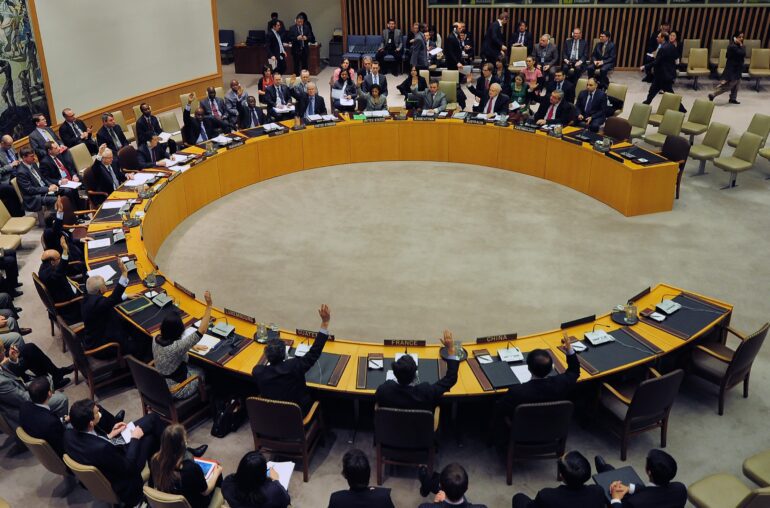TL;DR:
- United Nations Security Council holds its first meeting on artificial intelligence.
- China expresses concerns about the uncontrolled use of AI and supports U.N. coordination for establishing guiding principles.
- United States warns against AI being employed for censorship or repression.
- Britain’s Foreign Secretary highlights the transformative potential of AI and the need for global governance.
- U.N. Secretary-General advocates for the creation of a specialized U.N. body to govern AI, inspired by successful models in other fields.
- Calls for balancing scientific development, security, and AI’s impact on global peace and security.
- Discussions address both military and non-military applications of AI.
- Emphasis on collaboration, human rights, and leveraging AI for positive impact.
Main AI News:
The inaugural session of the United Nations Security Council dedicated to artificial intelligence (AI) convened on Tuesday, as global leaders convened to deliberate on the potential risks and benefits associated with this transformative technology. The meeting shed light on diverse perspectives, with China cautioning against the uncontrolled proliferation of AI, and the United States expressing concerns regarding its potential for censorship and repression.
Chaired by Britain’s Foreign Secretary James Cleverly, who assumed the presidency of the council in July, the gathering acknowledged the profound impact of AI on various facets of human existence. Cleverly emphasized that AI possesses the capacity to fundamentally reshape every aspect of life. Recognizing the absence of borders in the realm of AI, he stressed the urgent need for shaping global governance mechanisms for transformative technologies. He asserted that while AI could contribute to addressing challenges such as climate change and economic growth, it also harbors the potential for disseminating disinformation and supporting the proliferation of weapons by state and non-state actors.
The meeting saw the participation of distinguished speakers, including U.N. Secretary-General Antonio Guterres, Jack Clark, co-founder of the renowned AI startup Anthropic, and Professor Zeng Yi, co-director of the China-UK Research Center for AI Ethics and Governance. Guterres highlighted the far-reaching implications of AI, cautioning that both military and non-military applications of the technology could significantly impact global peace and security. He echoed the calls made by certain nations for the establishment of a specialized U.N. body to oversee collective efforts in governing this extraordinary technology. Drawing inspiration from successful models such as the International Atomic Energy Agency, the International Civil Aviation Organization, and the Intergovernmental Panel on Climate Change, Guterres stressed the need for a similar framework for AI.
China’s U.N. Ambassador Zhang Jun characterized AI as a “double-edged sword” and advocated for a central coordinating role for the U.N. in formulating guiding principles for its use. He emphasized the criticality of regulating AI to strike a balance between scientific development and security. Zhang urged the international community to prioritize the welfare of individuals and promote the positive applications of AI to prevent the technology from spiraling out of control.
Deputy U.S. Ambassador to the U.N., Jeffrey DeLaurentis, echoed these sentiments and underscored the importance of international collaboration in addressing human rights risks associated with AI and other emerging technologies. He unequivocally stated that member states should refrain from employing AI to suppress, censor, or disempower people. DeLaurentis urged countries to work together to mitigate these risks and safeguard peace and security.
Russia, however, questioned the necessity of the Security Council’s involvement in AI discussions, arguing that a scientific and expertise-driven dialogue should unfold over several years in specialized forums. Russia’s Deputy U.N. Ambassador Dmitry Polyanskiy called for a comprehensive, deliberative process.
Conclusion:
The United Nations Security Council’s inaugural meeting on artificial intelligence underscores the growing recognition of AI’s significance and the need for proactive governance. The diverse perspectives presented by participating nations highlight the complex challenges associated with AI, ranging from its potential for misuse to its positive contributions to addressing global issues. As businesses and markets navigate the evolving landscape of AI, it is crucial to consider the implications of responsible AI development, regulation, and collaboration. Striking a balance between harnessing AI’s transformative power and ensuring ethical use will be paramount for market stakeholders seeking to leverage AI for competitive advantage while upholding principles of transparency, human rights, and global security.

